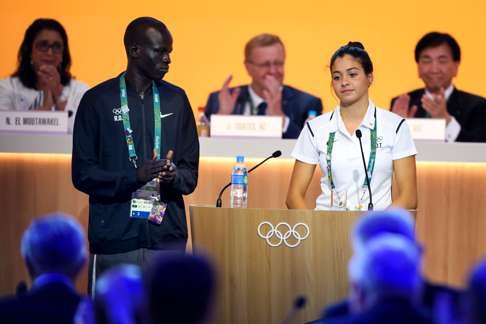
Even being associated with the IOC can’t taint the Rio Olympics refugee team
For the first time, a team representing the 55 million displaced people around the world will take part at the Games
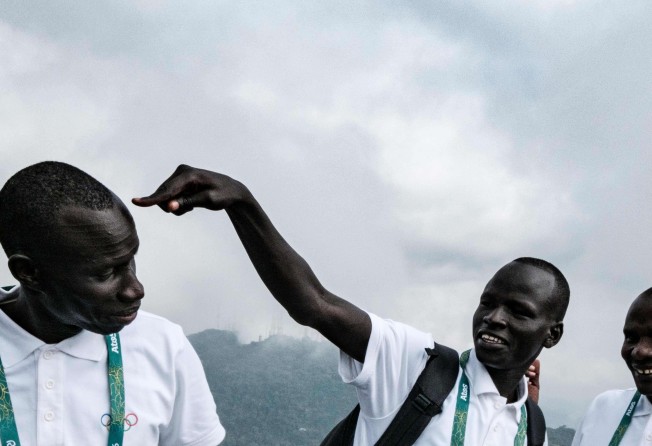
It’s a sign of just how comically super-villainous the International Olympic Committee is that even when they do something nice it’s hard not to be immediately suspicious.
So it was when they announced that a team of refugees would be competing at the Rio Games for the first time ever, to highlight the global crisis of displaced people.
By any measure, the joint initiative with the United Nations High Commission for Refugees should be impossible to criticise or carp about, but such is the IOC’s track record, my initial reaction was entirely cynical.
Spend a few minutes in their company though, and you realise that we have to give the IOC mandarins a break for once.

President Thomas Bach spent most of the committee’s first AGM session slating his counterparts at the World Anti Doping Agency for daring to point out Russia’s state-sponsored doping rather than leave it in its rightful under-the-rug home.
But after that, the 10 members of the Olympics refugee team were introduced, and received a standing ovation from the 100 or so fat cats present, a moment that had surely been a shared dream as they fled chaos and violence in Syria, South Sudan, the Democratic Republic of Congo and Ethiopia.
“The ultimate goal of the refugee team is that we don’t need one any more.” said Bach, and whatever you think of him and his cronies, we can agree with that.
Rami Anis and Yusra Mardini fled Damascus and Aleppo to Belgium and Germany respectively as the bombing in Syria became too much to take. Mardini and her sister had to swim behind a dinghy for hours in the Aegean, pushing it after its motor cut out.
Angelina Lohalith, Paolo Lokoro, James Chiengjiek, Rose Lokonyen and Yiech Biel are all runners, originally from South Sudan. They fled to the the sprawling Kakuma refugee camp in Kenya as children after their parents were killed or lost amid the country’s never-ending civil war.
Yonas Kinde fled political persecution in Ethiopia to Luxembourg and is competing in the marathon.
And Popole Misenga and Yolande Mabika sought asylum in Rio while competing for Congo at the 2013 Judo World Championships.
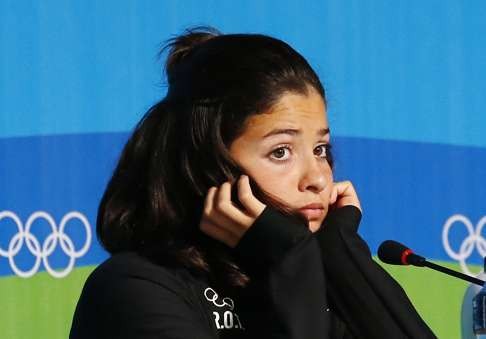
Mardini, a photogenic and articulate 18-year-old, was focus of most questions as the team met the world’s press.
“Without swimming I don’t think I would [have] survived,” she said - a literal statement.
“I think I will be honoured, proud, happy,” she added when asked about walking out at the Maracana for the opening ceremony. “I will have pain in my stomach because of the great feeling. I’m going to think of everyone who supported me, my coaches, my dad, my family friends, and all the refugees around the world.”
Anis, 25, competed at swimming’s World Championships in 2009 and 2011 before fleeing the worsening situation in Syria. He has unfinished business with US star Michael Phelps, who was too focused on his training to take a picture with him in 2009.
“He is a role model and I do hope this time he will be able to take a picture with me!” he said.
“This is a dream for any athlete … I am proud I am part of it, even though as a refugee; obviously I think about my homeland - and I hope that by Tokyo 2020 there will be no refugees.”
Popole and Mabika paid tribute to the people of the host nation. “Brazil is my home and I have a Brazilian son and daughter [now],” said Popole, who lost his family as a nine-year-old and hid in a forest for more than a week before managing to get on a truck to Congo capital Kinshasa and being put in a home.
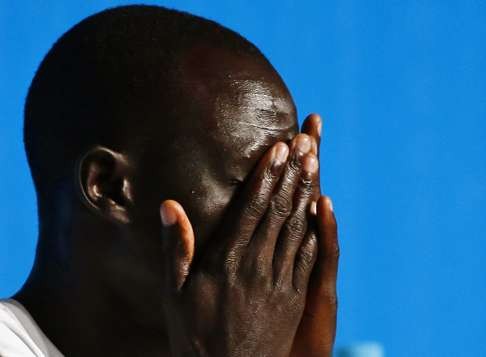
The UNHCR estimates that there are 59.5 million displaced people in the world at present, the highest ever recorded, one for every 122 people, and half of them children. Mardini pleaded for empathy.
“ A lot of things happened in our lives [that were] really bad, but life will not stop for you, your pain or your problems, at some point you have to move on,” she said. “We remember the good things, memories and motivate ourselves [with] that.
“I want everyone to think that refugees are normal humans who had homelands and lost [them] not because they want to, not because they wanted to run away or have drama in their lives ... I want them to think what happens there could happen in your hometown too.”
The South Sudanese contingent were selected through events in Kakuma and Dadaab refugee camp, which between them are home to more than half a million people, large numbers of whom travelled thousands of miles as orphaned children to escape horrors in Sudan and Somalia. Tegla Loroupe, Kenyan former world record marathon holder (and 2006 Hong Kong half-marathon winner), helped to choose and train the athletes through her charitable foundation.
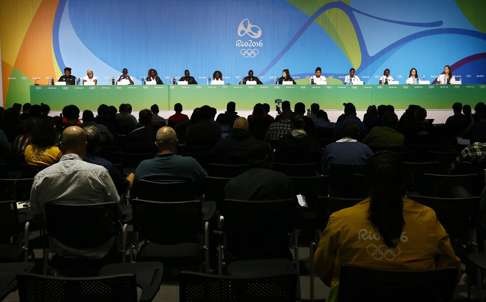
Biel, who had lived in Kakuma for more than 10 years since fleeing Sudan as an 11-year-old, only took up running a year ago. Today he trains with the others under Loroupe in Nairobi and will compete in the 800m.
He had the last, powerful, words.
“We have had a tale of sorrow, now a tale of joy, this will change our lives,” he said. “Now we can call ourselves ambassadors. After Rio this is not the end. I hope it is a door opening for other young talented people from camp and our country. We left because of war and we [ourselves] have to change that situation, not other people.”
Even the IOC can’t taint that sentiment.